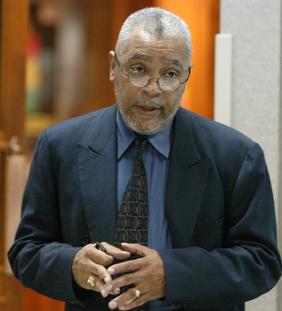Panel criticizes Illinois’ policies on drugs, crime

Walter Boyd speaks about Illinois drug laws at the “Race and Incarceration Panel” at PAR on Tuesday. Beck Diefenbach
March 29, 2007
Walter Boyd was convicted for a drug-related crime in 1976. He served in a corrections facility for 24 years. Tuesday night he informed a crowd of University students and community members that non-white individuals were 57 times more likely to be arrested for drug-related, non-violent crimes than white individuals.
Boyd, who now serves as a representative for the Protestants for the Common Good in Chicago, was a member of a panel addressing racial disparities in incarceration in Illinois Tuesday evening at Saunders Lounge in Pennsylvania Avenue Residence Hall. Adam Wolf of the American Civil Liberties Union Drug Law Reform Project in Santa Cruz, Cali., was the other speaker.
The panel was presented by the Illinois Drug Education and Legislative Reform organization and the Coalition of Students for Social Change, along with 10 Registered Student Organizations.
The purpose of hosting the panel was to educate and enable people to look at legislative policies, specifically drug policies, with a more critical eye, said Shaleen Aghi, graduate student in law and leader of the Coalition of Students for Social Change.
“Our drug policy is flawed,” Boyd said at the discussion.
Get The Daily Illini in your inbox!
Aghi said the goal of holding the panel was to eliminate the stigma associated with altering drug policies.
An example she gave at the discussion was the Higher Education Act, which provides financial assistance for college students. However, any student with drug convictions is denied access to financial aid for college despite the fact convicted criminals could still receive financial aid.
“What I wanted was for people to see that reforming drug laws is not about trying to legalize marijuana,” she said.
The act forces low to middle income students with any drug-related background to drop out of college, which hinders the war on drugs because college students use fewer drugs than people who are of the same age and not in school, she said.
“I don’t have much faith in the federal government at this moment,” Wolf said.
The panel also discussed selective enforcement, when police patrol certain neighborhoods, often predominantly black ones.
“This is a really important social justice issue in Illinois,” Aghi said.
Dorothea Galdo, senior in LAS, attended the panel and said she was surprised to find the judicial system to be discriminatory towards minorities.
“I’m really interested in social stratification, so learning about the disparities within the drug usage and arrests and drug crimes was very educational, very surprising,” Galdo said.
“People care,” Aghi said. “No one wants to be in a state leading a country in racial disparities in prisons.”






